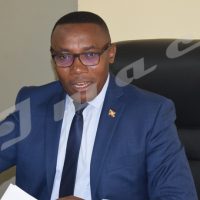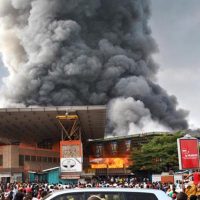A mobile clinic at Bujumbura International Airport, including a well equipped kit composed of a pair of gloves, glasses, mask, overshoes, plastic blouse, and waterproof overalls is now available for preventing any suspected cases of ebola from entering the country, according to the Director General of Health in the Ministry of Public Health.-Diane Uwimana

Nurses are waiting for passengers to fill in the health declaration form at Bujumbura International Airport ©Iwacu
It is no longer allowed for any international passengers to enter Bujumbura International Airport, without being checked. There is a team composed of two nurses accompanied by a group of supervising doctors who await all passengers from abroad. The nurses wear gloves with disinfectant and sit at the arrival gate for international flights. Five meters away, there is a waiting room for people suspected of carrying the ebola virus.
“If we find a suspected passenger, we put him in quarantine before transferring him either to the Prince Regent Charles or Roi Khaled Hospitals for follow-up treatment”, one of the nurses says. The nurses indicate that they have a health declaration form available, to detect if a passenger should be suspected and whether or not he or she comes from an affected country.
The health declaration form includes the personal details of the passenger, the country of origin, airport of origin, airport of transit and some questions related to ebola symptoms such as fever, vomiting, diarrhoea, an unusual tiredness and abnormal bleeding.
“We put international measures into practice”
Since the epidemic disease was first observed in different West-African countries such as Guinea, Liberia, Nigeria and Sierra Leone earlier this year, the World Health Organisation (WHO) announced emergency measures to fight against ebola. “The WHO classifies countries in three categories: countries affected by ebola, countries bordering affected countries and other countries”, Dr Liboire Ngirigi, the Director General, mentions.
He points out that Burundi is among the ‘other countries’ which are neither affected by the ebola virus, nor border affected countries.
“Now, we follow up the measures taken by the WHO at the international level”, Dr Liboire Ngirigi points out.
Burundi will not empede people travelling inside the country, but measures towards people from countries affected by ebola will be put into practice. Countries should not only inform passengers about the epidemic, but they must also be prepared to detect and take care of people infected. “That’s why we are preparing a large quantity of informational flyers, to inform a big number of people”, adds Dr Liboire Ngirigi.
The Director General also indicates that the WHO declared that countries must facilitate the evacuation and repatriation of people who are exposed to the virus: “We have signed an agreement with an Uganda laboratory that sends us the test results in 48 hours in case of any suspicions”, Dr Liboire Ngirigi ensures. It is worth mentioning that new cases of ebola are observed in the Democratic Republic of Congo, raising fears that the virus will spread further across Africa. However, it appears to be a different strain from the one found in West-Africa, making it the second ebola outbreak in Africa in 2014.
——————————————————————————————————————————————————
Ebola symptoms include fever, weakness, muscle pain and sore throat, before progressing to vomiting, diarrhoea and rash. Some people may also experience bleeding. Ebola is spread through direct contact with infected body fluids. It is one of the world’s deadliest diseases.



















 IWACU Open Data
IWACU Open Data

